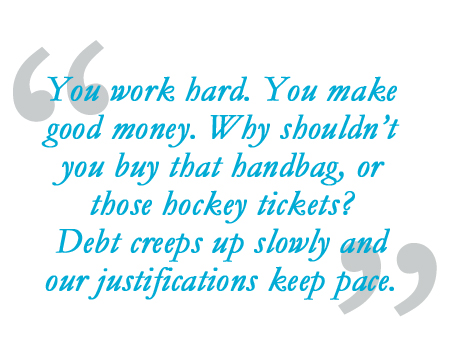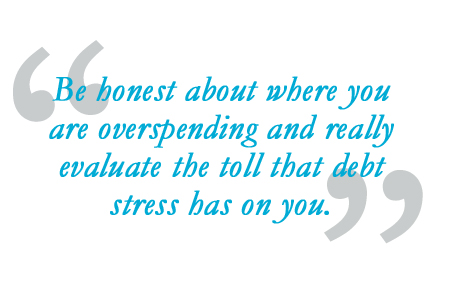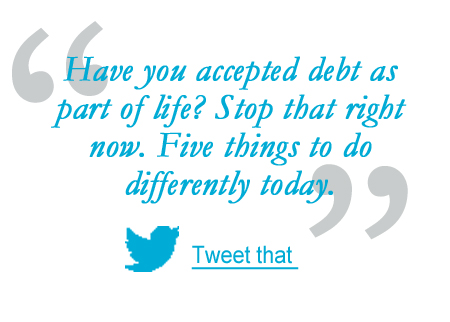By Kathryn Mandelcorn, FMA
 You did all the right things. You went to school and earned a good education. You’ve worked hard and been promoted. You earn upwards of $100,000 a year; yet increasing debt has your stomach in knots.
You did all the right things. You went to school and earned a good education. You’ve worked hard and been promoted. You earn upwards of $100,000 a year; yet increasing debt has your stomach in knots.
You are not alone. According to statistics Canada, higher income is associated with a higher debt load. Households earning at least $100,000 had an average debt of $172,400. Compare that to households earning between $50,000 and $100,000, which had an average debt of $95,400.
It doesn’t have to be this way. But before you can turn things around, it’s important to understand how you arrived where you are.
How Did I Get Here?
Technology has changed the world dramatically in the last 20 years. In many ways for the better, but the internet has also put shopping at our fingertips and smartphones keep us constantly connected to our work, and the work and lifestyles of everyone around us.
This new world has given rise to three of the primary reasons so many people are in debt despite earning a good salary: increased expectations of what we “deserve,” reduced downtime, and the erosion of debt stigma. Let’s look at the effect of each one.
Increased expectations
Social Media offers up an upbeat, curated version of everyone’s lives. Your neighbour just got back from Cuba; your co-worker bought her daughter a car for graduation; that guy  you knew in high school just landscaped his lakeside property; and your best friend posted a photo of her spa getaway in Whistler.
you knew in high school just landscaped his lakeside property; and your best friend posted a photo of her spa getaway in Whistler.
You work hard. You make good money. Why shouldn’t you buy that handbag, or those hockey tickets? Why not go on that trip to Ireland, or buy a new car? Why shouldn’t your kids attend that competitive soccer camp? Debt creeps up slowly and our justifications keep pace.
Reduced time
Work and play keep us very busy. We meet friends for dinner one night; head out to yoga the next. We answer work emails while waiting for our kids to finish lessons and practices. We mow the lawn and get the groceries. We go to the gym, movies, and concerts. We plan for meetings and presentations. We never seem to stop. As long as the money keeps flowing, who has time to plan long term or manage a budget?
No longer any stigma
In our grandparents’ time, debt was something to be avoided. Being in debt carried shame and embarrassment. While I’m not an advocate for shame, the normalization of being in debt hasn’t made life better; it has allowed debt to flourish. Today, many people would be less embarrassed to admit they have debt than to admit they can’t afford something.
What Can I Do Differently?
You can get out of debt, you just need to challenge your perceptions and do things differently. Here are five ideas to get you started today.
Create an authentic vision for your life
Have you ever realized you wanted something only when you saw someone else had it? Maybe you were completely happy with your family camping trips until you saw your friend’s photos from Europe. Suddenly you wondered if you should be travelling more. Before you jump on a travel site, step away from the computer and think about what you really want. Define two or three financial goals for yourself that align with your values.
 Be honest about your current situation
Be honest about your current situation
Have you accepted debt as part of life? Stop that right now. Be honest about where you are overspending and really evaluate the toll that debt stress has on you. The moment you tell yourself living with debt is not O.K. you will become more creative and awake to new ways of doing things.
Create a plan and systems
Living in the moment is great for meditation and calming your mind, but money needs a plan. Learn to track your daily expenses. Understand what you need to save and invest to have the kind of retirement you feel good about. Be realistic. Challenge your assumptions about what’s a necessary expenditure.
Have positive money conversations
You’ve probably commiserated with friends about how expensive everything is, and how just when you think you’re getting ahead, the car breaks down or the roof leaks. These are the conversations that normalize debt and keep everyone stuck. Instead, talk to your spouse, family and friends about positive money goals and how you plan to achieve them. Read books about money management, examine your relationship to money and make it healthier if necessary. Don’t abdicate responsibility for your financial future to anyone. If you need help, get it.
Changing your habits, reaching goals and eliminating debt, takes time. Waiting to start means it will just take longer, or never happen at all. A small change today will start the ball rolling. Once you get some momentum, the financial and emotional rewards will keep you going. You will never regret making these changes, no matter how difficult they may seem on day one. Create an action plan that is achievable and acknowledge every change and success along the way.
What if I Don’t Do Anything Different?
The cost of inaction is just too great. No matter how many Canadians are in debt, debt is not normal or O.K. It steals your piece of mind and puts the security of your future at high risk. Interest rates will go up and a debt that seems manageable now could suddenly impact your life in a significant way.
If you have children, look at the message you are sending them. Acting like it’s possible to have everything without consequence or trade-offs, is setting them up for disappointment and debt of their own.
Over time, debt will wear you down. It can affect your relationships, your self-esteem, and your health. Living well is not enough; you also need to sleep well, knowing that you are in charge of your financial future.
What You Really Deserve
You work hard; you deserve to put that hard earned money to work for you. You deserve to reach goals that matter to you. You don’t deserve to have your money evaporate on interest payments for things you barely remember buying. The first steps to change are acknowledging that change is possible and being honest with yourself about your current situation.
Money Coaches Canada co-founders Karin Mizgala and Sheila Walkington wrote the book Unstuck How to Get Ahead Financially and Start Living the Life You Want, to help people get clear about where they are now, where they want to be and how to get there. It is possible to live debt free.
We hope this article has been helpful and provided some practical advice on how you can improve your financial well-being. If you need additional support, please contact one of our Money Coaches today.



